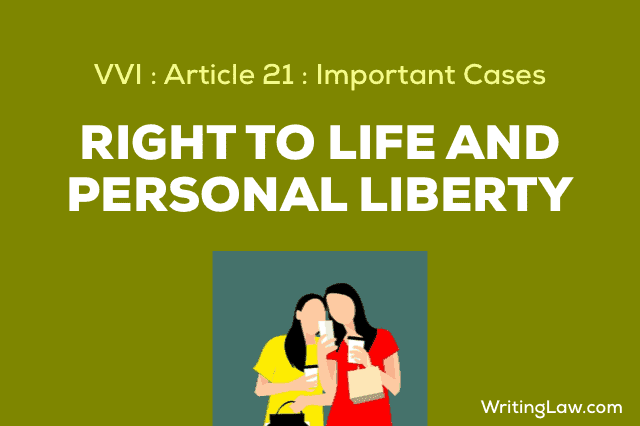Table of Contents
Court – Supreme Court of India
Citation – 1978 AIR 597, 1978 SCR (2) 621, 1978 AIR 597, 1978 SCR (2) 621
Coram – Hameed Ullah Beg CJI, Y.V. Chandrachud, P.N. Bhagwati, V.R. Keishna Iyer, N.L. Untwalia, S.M. Fazal Ali & P.S. Kailasam
Theme: Transformation of the judicial view on Article 21 of the Constitution of India so as to imply many more Fundamental Rights from Article 21.
Summary of the Facts
The petitioner (Maneka Gandhi) was a writer whose visa was given on June1, 1976, under the Passport Act, 1967. Later, on the July second, 1977, the Regional Passport Officer, New Delhi, had requested the solicitor to give up her identification by a letter posted. On being approached about the purpose behind her visa seizure, The Ministry of External Affairs declined to create any reasons, in light of a legitimate concern for the overall population. In this manner, the petitioner had documented a writ request under Article 32 of the Constitution of India expressing the seize of her visa as the infringement of her key rights; explicitly Article 14(Right to Equality), Article 19(Right to Freedom of Speech and Expression) and Article 21(Right to Life and Liberty) ensured by the Constitution of India.
The falsified expressing that the solicitor was required to be available regarding the procedures which was going on, before a commission of Inquiry.
Issue
- Is there any nexus between the arrangements referenced under Articles 14, 19 and 21.
- Extent of the word “Procedure Established by Law”.
- Regardless of whether option to travel abroad lives in Article 21.
- Regardless of whether an authoritative law that removes Right of Life is sensible.
Judgement
The milestone judgement went ahead 25th January 1978 and changed the scene of the Constitution of India. This judgement extended the extent of Article 21 exponentially and this judgement genuinely and truly made India a government assistance state as guaranteed in the preamble. The seven appointed authority seat gave a consistent choice with the exception of certain adjudicators agreeing on certain focuses.
There were seven separate assessments in which the larger part conclusion was composed by Justice Bhagwati for himself, Untwalia & Fazal Ali JJ. while Chandrachud, Iyer& Beg(CJ) composed separate yet agreeing sentiments. The significant discoveries of the Court were as per the following:
- The court while conveying this milestone judgment changed the scene of the Constitution by holding that however the expression utilized in Article 21 is “strategy set up by law” rather than “fair treatment of law” nonetheless, the technique must be liberated from discretion and madness.
- Despite the fact that the Constitution creators must be regarded, yet they never expected to plant such a self – damaging bomb in the heart if the Constitution. They were never of the psyche that the strategy need not really be sensible, just and reasonable. They drafted this Constitution for the insurance of the “individuals of India” and such translation of Article 21 will be counter-beneficial to the assurance offered by the Constitution.
- The court overruled Gopalan by expressing that there is an exceptional connection between the arrangements of Article 14, 19 and 21 and each law must breeze through the assessments of the said arrangements. Prior in Gopalan the lion’s share held that these arrangements in itself are fundamentally unrelated. Consequently, to address its previous mix-up the court held that these arrangements are not totally unrelated and subject to one another.
- The court held that the extent of “individual freedom” isn’t be interpreted in tight and stricter sense. The court said that individual freedom must be comprehended in the more extensive and liberal sense. Hence, Article 21 was given an extensive translation. The court committed the future courts to grow the skylines of Article 21 to cover all the Fundamental Rights and abstain from interpreting it in smaller sense.
- The option to travel abroad as held in Satwant Singh is inside the extent of ensures referenced under Article 21.
- Segment 10(3)(c) of Passport Act 1967 isn’t violative of neither Article 21 nor Article 19(1)(a) or 19 (1)(g). The court additionally held that the said 1967 arrangement likewise not in logical inconsistency of Article 14. Since the said arrangement accommodates a chance to be heard. The court dismissed the conflict of solicitor that the expression “in light of a legitimate concern for the overall population” isn’t obscure.
- The court held that Section 10(3)(c) and 10(5) is a managerial request subsequently, open to challenge on the grounds of mala fide, outlandish, refusal of characteristic equity and ultra vires.
- The court additionally proposed government to customarily give reasons for each situation and should once in a while utilize the right of Section 10(5) of the 1967 demonstration.
- The rights talked about under 19(1)(a) and 19(1)(g) are not bound to the regional furthest reaches of India.
Conclusion
The Maneka Gandhi judgment was a decent judgment and is perhaps the best judgment that Indian Supreme Court has ever given. The judgment’s most noteworthy element was the interlinking it built up between the arrangements of Article 14, 19 and 21. By the goodness of this connection the court made these arrangements indistinguishable and a solitary element. Presently any technique to be legitimate needs to meet all the prerequisites referenced under Article 14, 19 and 21. Subsequently, it extended the extent of individual freedom exponentially and secured the protected and crucial right to life all things considered.
Author: sushma,
Ideal Institute of Management and Technology, 2nd year (BALLB)

